|
Introduction
My husband and I had a great day with our three-year old son. We played outside, went to the park, and enjoyed a nice dinner out at a restaurant. My son was playful, funny, and respectful. He listened, shared, and engaged in conversation. We had praised him and thanked him for a great day. But… Then, just before bed, he started climbing all over our coffee table and knocking things down. Not that big of a deal…yet. However, he made his way over to a glass vase. He started moving it dangerously close to the edge. We politely asked him to stop a few times, but he ever so slowly continued to scoot it to the edge of the table. This time we responded in sterner voices and warned him against knocking it over. He paused, looked us dead in the eyes, and in one swift motion flung his hand and knocked over the vase. The vase, luckily, didn’t break, but bits of pieces from the faux grass in the vase went everywhere. While we were cleaning it up, he ran to the bathroom, peed in the toilet, and then dumped water and pee all over the floor. We were, of course, livid. That is a normal feeling to a kid's bad behavior. However, at this moment I, as a parent, had a choice on how to respond to my kid’s bad behavior. Would I make one of the 4 mistakes other parents usually make when responding to their kids' bad behavior? Lauren Barrett Writes is a participant in the Amazon Services LLC Associates Program, an affiliate advertising program. As an Amazon Associate, I earn from qualifying purchases. Read more about these links in my disclosure policy.
4 Mistakes Most Parents Make When Responding To Their Kids Bad Behavior
In today’s blog post, I have 4 tips for parents that will help them respond to their kid’s bad behavior in a more generous way. *These mistakes and fixes can also apply to teachers and students*
Mistake #1: Thinking Their Kids are Bad
After Henry knocked over the vase and spilled water and pee on the floor, it would have been natural and easy for me to say something like this… “Why are you being so bad?” Or “You are being very bad right now. Stop it.” (Insert the words rude, lazy, mean, evil in other situations of bad behavior) Kids’ behavior can be bad. Kids aren’t bad. It’s easy to confuse the two. Here are a few things to remember before you start labeling your kids as bad to them directly:
It’s very tempting to believe that when your kids start exhibiting bad behavior that they are bad kids, and you question why they are like that and where did you go wrong. As parents, we sometimes make the mistake of saying this aloud to them right after their bad behavior. But don’t. Here’s what to do instead… Fix #1: Assume the Most Generous Interpretation Assuming the most generous interpretation is exactly like what it sounds. We, as parents, give ourselves a generous reason for why our kids are participating in bad behavior. For my son, at that moment, I assumed it was because he was tired and wanted to get our attention that he wanted to go to bed (Spoiler alert - that was the reason). I first heard of Most Generous Interpretation from Dr. Becky from Good Inside. As a clinical psychologist and mom to three, she says that applying the Most Generous Interpretation speaks to what is going on in the inside rather than the outside, it helps dysregulated kids feel better about themselves, kids respond in the same manner to how we respond to them (i.e. “You always misbehave” equates to your kid continuing to misbehave). Here are things to say when we apply the Most Generous Interpretation:
Applying the Most Generous Interpretation, doesn’t mean that there are never consequences for your kids, especially those yellow/red light behaviors. It just means that you recognize that your kids make mistakes and that they are capable of change and being better. Use these strategies to greenlight positive behaviors in your kids.
Mistake #2: Getting Into Power Struggles
No one is going to win in a power struggle. Even if you technically “win,” it’s more than likely going to come at the expense of both losing your tempers and a lot of time wasted arguing back and forth. Let’s go back to my example with my son knocking over the vase and spilling water and pee. I could have demanded that he clean everything up until I was red in the face to teach him a lesson. But he more than likely would have said “NO!” each and every time. Tempers would’ve flared, and we would have been at a standstill for a long time. And in the end, we would have probably cleaned it up anyway. Why? Because remember the Most Generous Interpretation? The root of the bad behavior was because my son was tired. He wanted to go to bed NOW. Yelling back and forth and asserting your authority isn’t going to work. But, obviously, our kids shouldn’t always get away with bad behavior. So what to do instead… Fix #2: Establish and Hold Boundaries, Offer Choices, Provide Consequences The first thing to do when our kids initiate a power struggle is to hold our boundaries that we have already established. *Side Note* Family rules should be talked about often and consistently. Then, you can offer choices. “Okay, I see you’re upset and tired right now. You can either go to bed right now, but we aren’t reading any books (or playing quietly with your trucks) or you can clean this up, and we can read one book.” Whatever your choices are make sure you, as parent, are ok with either choice and that the choices logically make sense for your kid for what is happening in that moment. Lastly, sometimes consequences - either natural or manufactured - are necessary. Your child consistently knocks over the vase you told him not to knock over? Time out. Your child keeps throwing the same toy over and over even though you said not to? Take the toy away. Your child won’t eat the food and choices you provided for her at dinner? She doesn’t eat dinner and might be hungry. So instead of arguing and giving multiple warnings, state the boundary, choice, or consequence one to two times and then follow through. No more power struggles with this 3-step process.
Mistake #3: Not Being Calm When Responding
A mistake parents often make when responding to their kids' bad behavior, is looking at their kids first before looking at themselves. Kids’ bad behavior is very triggering, so our initial gut reaction is to be upset too. We might start yelling, name calling, or even crying as a reaction to our kids’ bad behavior. And guess what? More than likely our kids will mirror what we are doing. Which is exactly what we don’t won’t. And the more upset they get, the angrier we will become. And the cycle continues. So what to do instead? Fix #3: Calm Yourself First As I mentioned, kids mirror your reaction. So if they mirror parents when the parent is upset, the inverse is true. Parents’ calming responses will, you guess it, calm your child. First, calming myself might look like this… I close my eyes, take 5 deep breaths, and repeat this mantra: "Tantrums are normal. Tantrums are a healthy release. They aren't a reflection of my parenting. I am a good mom." Instead of saying something like…. “Did you not hear me? I said that it’s time to go to bed. I’m not going to tell you again. Why don’t you listen to me? Get upstairs right NOW!” I *TRY* to then go to a place of empathy first. “I know it’s hard to listen when you’re so tired. You really want more TV, but it’s time to go to bed to get some rest. I know. That’s not fun and not what you want to do. But, maybe we can make bedtime more fun by reading a book first.” Our kids will feel better that their feelings are at least heard and that their parents are not angry with them. Calming yourself first takes practice, so have patience with yourself.
Mistake #4: Taking It Personally
When your kids behave badly, it often isn’t a personal attack against you. It’s not because they want to hurt you or don’t like you. But, often parents take it as a personal affront. When parents take things personally, they can overreact, say hurtful, regretful things, and either dole out severe punishments or even no punishment at all. A mature sense of empathy doesn’t develop until much older, so kids aren’t out to get their parents. They are more than likely solely focused on what they want. So, how do we not take our kids’ bad behavior so personally? Fix #4: Focus on Behavior When your kid is acting out, remember it isn’t about you and your feelings. It’s about changing the behavior you don’t like You can always say that you didn’t like what they did. “When you knocked the vase over, I didn’t like that.” But then go back to the behavior… “You were feeling angry. It’s okay to feel angry. But we need to find a better way to act when you are angry. Because you can’t knock over vases.” Try to problem solve what your kid can do instead when they are angry. “Next time, when you are feeling angry, you can hug yourself instead or ball your hands into fists.” You can even problem-solve over consequences if it happens again. “If you do that again, we will have to have some consequences. You’ll have to go to time-out.” Shifting away from your feelings to the behavior will help your kids have a clear solution to what needs to be changed. And as always, try to apply the Most Generous Interpretation because we never really know what someone is going through.
Wrapping It Up
I get it. Kids' bad behavior is very triggering. We want to yell, argue with them, demand them to do things, and question why they are so bad. But all of those things do not focus on what we really want - to repair and change the bad behavior. So next time, your kid does something you deem bad, take a deep breath and remember these four fixes. Check out my parenting guide, Now What?, on different strategies to do during life’s hard moments with your kids.
0 Comments
Leave a Reply. |
Categories
All
|
Proudly powered by Weebly


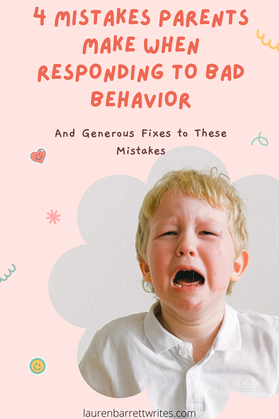
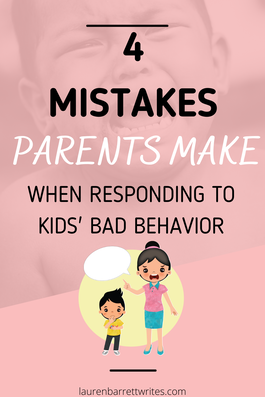
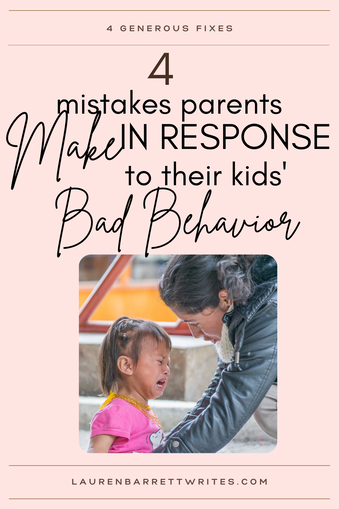
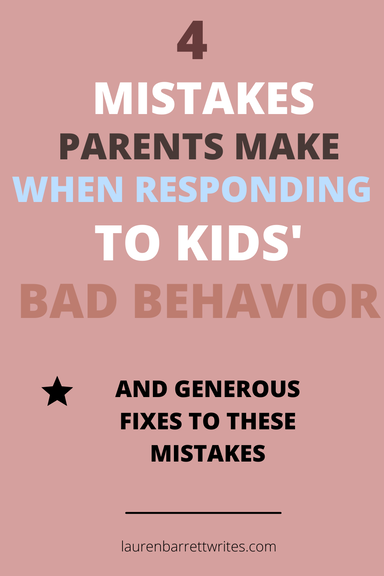
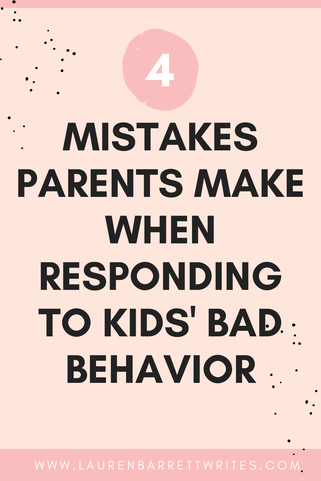

 RSS Feed
RSS Feed